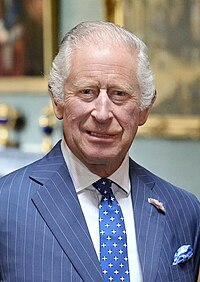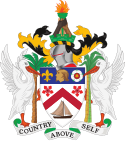| King of Saint Kitts and Nevis | |
|---|---|
Federal | |
 | |
| Incumbent | |
 | |
| Charles III since 8 September 2022 | |
| Details | |
| Style | His Majesty |
| Heir apparent | William, Prince of Wales |
| First monarch | Elizabeth II |
| Formation | 19 September 1983 |
 |
|---|
| Administrative divisions (parishes) |
The monarchy of Saint Kitts and Nevis is a system of government in which a hereditary monarch is the sovereign and head of state of Saint Kitts and Nevis. The current monarch of Saint Kitts and Nevis, since 8 September 2022, is King Charles III. As sovereign, he is the personal embodiment of the Crown of Saint Kitts and Nevis. Although the person of the sovereign is equally shared with 14 other independent countries within the Commonwealth of Nations, each country's monarchy is separate and legally distinct. As a result, the current monarch is officially titled King of Saint Christopher and Nevis and, in this capacity, he and other members of the royal family undertake public and private functions domestically and abroad as representatives of Saint Kitts and Nevis. However, the King is the only member of the royal family with any constitutional role.
All executive authority is vested in the monarch, and royal assent is required for the National Assembly of Saint Kitts and Nevis to enact laws and for letters patent and Orders in Council to have legal effect. Most of the powers are exercised by the elected members of parliament, the ministers of the Crown generally drawn from amongst them, and the judges and justices of the peace. Other powers vested in the monarch, such as dismissal of a prime minister, are significant but are treated only as reserve powers and as an important security part of the role of the monarchy.
The Crown today primarily functions as a guarantor of continuous and stable governance and a nonpartisan safeguard against the abuse of power. While some powers are exercisable only by the sovereign, most of the monarch's operational and ceremonial duties are exercised by his representative, the governor-general of Saint Kitts and Nevis.